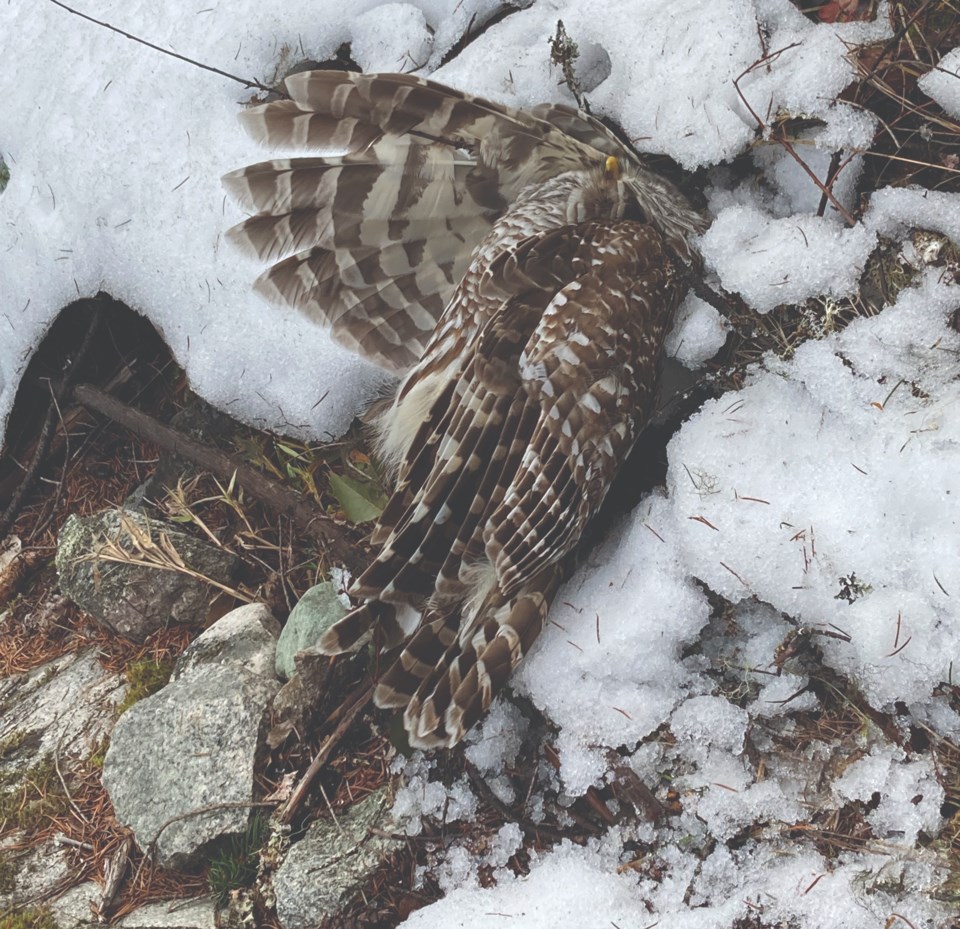While riding her bike last summer, Pemberton local Nicole Jean came across a dying hawk on the side of the trail. Wanting to help, she rode into a nearby yard to see if the homeowners had gloves she could borrow to safely transport the bird to an animal rehabilitation centre, but unfortunately the bird died before it could get treated.
While there tending to the suffering hawk, the homeowners recounted their own story to Jean of seeing a hawk drop dead out of the sky and land in their yard just one day before.
Fast forward a few months, while out for a walk on a crisp February day, Jean once again came across a large bird dead in the snow. This time it was a Barred Owl.
“I have now found three dead birds in the last seven months. And I’ve just had knee surgery so I’m not exactly out and about covering a large amount of terrain, yet still have managed to find three animals,” said Jean, who made a post on the Pemberton Community Forum Facebook page to bring awareness to her concerns.
“Since that post five other people have contacted me to say they’ve found dead owls and hawks. I’ve lived in Pemberton for a long time, 25 years, and have noticed in the last year that in my neighbourhood there have been fewer [large birds]. Normally, in the spring, you see the hawks sitting on a fence post, but they’re not there anymore.”
From there, Jean contacted someone at the provincial Ministry of Environment who then put her in touch with the British Columbia Interagency Wild Bird Mortality Investigation Plan, which took in the bird for testing.
While she has not received the test results yet, Jean believes the deaths could be caused by slow-acting rat poisons entering the birds’ systems through the rodents that they hunt.
Although the cause of death can’t be known for certain until test results come back, Jean’s hypothesis isn’t a far stretch. In fact, it has been an issue across the province for years, according to BC SPCA research communications specialist Erin Ryan.
“I think the biggest problem with this issue is we don’t know the full scope of how big it is,” she said. “So owls that eat poisoned rodents, if the poison doesn’t kill them right away, we often don’t see the sub-lethal effects. And I think this has been happening for a very long time, but I think in the last couple years there has definitely been a pique in community interest because community members are the ones finding these poisoned animals out in the wild and it’s upsetting to them.”
Ryan explained that anti-coagulant rodenticides—which work by thinning the blood and causing the animal to slowly die from internal bleeding over days or weeks—have been the most prominent tool in the pest control industry for a long time, which has led to everyday people following that lead for their own rat and mouse problems without realizing the dangers they present to other animals higher in the food chain.
With the increased awareness of this issue over the last couple years, the B.C. Government imposed a temporary, 18-month ban on all second-generation anti-coagulant rodenticides across the province, which took effect in July of 2021.
Second generation rodenticides were designed to be more potent and faster-acting, which in turn means they are also more dangerous for animals that prey on the rodents that eat them.
Moving forward, Ryan hopes to see a more comprehensive ban on rodenticides across the province, and hopes the pest control industry does a better job of identifying why a home has a pest problem in the first place—and addressing the root causes instead of resorting solely to poisonings.
“The part that gets overlooked a lot is a truly integrated pest management approach,” she said. “As long as there is food and shelter, the mice and rats will just keep coming back. So what I’d like to see the industry do more of, and what customers can do, is more of that proactive management. Keeping on top of sanitation and building maintenance to make sure we are preventing problems before they happen.”
Meanwhile in Pemberton, Jean is set to make a presentation to the village’s mayor and council on April 5, and hopes to see them adopt a policy to join the other 20 B.C. municipalities that have completely banned anti-coagulant rodenticides already.
For more information on alternative options for rodent control visit spca.bc.ca/urban-wildlife.

